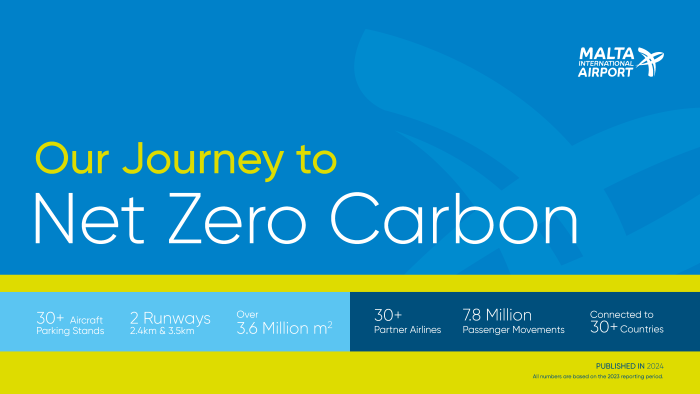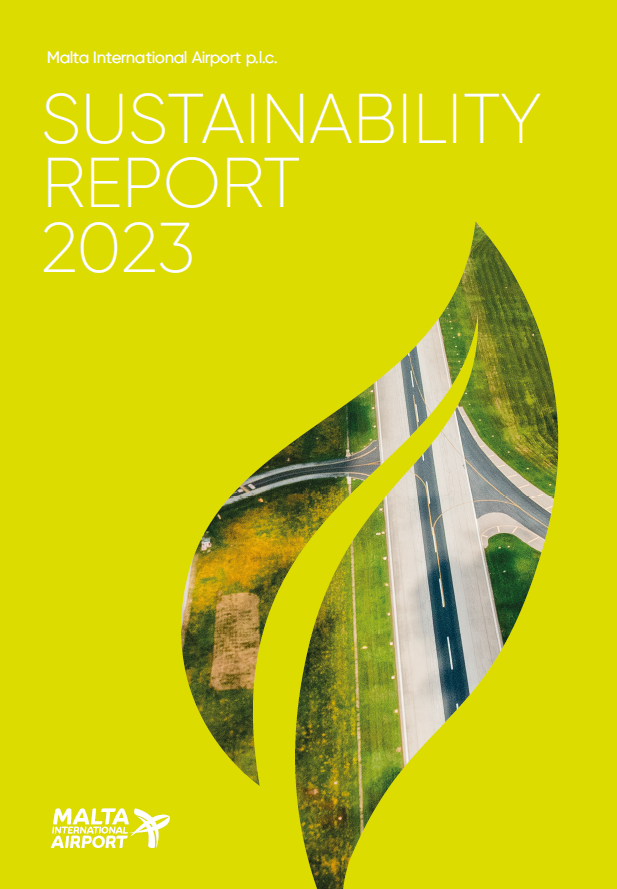Sustainability
Net Zero Carbon Plan
Our Net Zero Carbon Plan outlines our decarbonisation strategy towards achieving carbon neutrality by 2025 and net zero carbon emissions by 2050.
The plan builds on the significant progress we’ve made, having already reduced emissions within our control by 31% since 2015, and applied for level 3 of Airports Council International’s Airport Carbon Accreditation programme.
Our Net Zero Carbon plan may be viewed in full below.
Sustainability Reports
Malta International Airport published its first sustainability report adhering to the Global Reporting Initiative in 2015, becoming the first Maltese company to embrace these internationally recognised standards.
In these annual sustainability reports, the company presents its environmental, economic, and social efforts; made in a bid to be a more responsible player in the community within which it operates to create value for all stakeholders.
Take a look at milestones from our sustainable journey, or flip through the sustainability reports themselves, below.
2022 Sustainability Report Highlights
Scope 3 Emissions Data Collection
In 2022 we began to collect data in relation to Scope 3 emissions, which will allow us to have a more comprehensive understanding of our carbon footprint while identifying new initiatives that can help us decarbonise our operation.
An increase in PV generation
The amount of clean energy generated by our PV panels amounted to around 3.2 million kWh, marking an increase of 53.2% over 2021.
Training and education
During the year, employees collectively undertook more than 11,000 hours of training. Additionally, 6 students were given the opportunity to undertake on-the-job training that was directly related to their fields of study.
Throughout the year, the company worked with 900 suppliers who benefitted from a total spend of more than €43 million. Local suppliers benefitted from 91% of this total.
2021 Sustainability Report Highlights
A new PV system on campus
In 2021, we installed our fourth PV system, which is expected to contribute to an increase of 60% in the amount of clean energy generated on campus in 2022.
The ACA Programme
2021 saw us progress to Level 2 of the Airport Carbon Accreditation (ACA) Programme, following the submission of evidence that a senior committee is responsible for climate and energy matters, together with having a detailed carbon plan in place.
Protecting the Wellbeing of the Team
Throughout 2021, the company continued to give employees free access to a nearby gym and mental health sessions delivered by professionals, as well as provide complimentary eye tests and the services of a doctor thrice weekly. 94% of the employees who responded to the Employee Survey 2021 agreed that the company focuses sufficiently on employee wellbeing.
2020 Sustainability Report Highlights
Generating More Clean Energy
In 2020, the airport’s photovoltaic systems generated 2,106,340 kWh of clean energy, which is enough to power around 250 average households for a whole year!
Investing in More Efficient Lighting
In 2020, the company continued to implement
its energy-saving programme, completing major lighting
upgrade works. Older lighting systems on Runway 13-31, Runway 05-
23 and Apron 9 were replaced with more energy-efficient
alternatives, which are expected to consume up to 77% less
energy than the previous systems.
Investing in the Team
Despite the challenges posed by COVID-19, Malta International Airport was still successful in delivering 5,247 hours of training to its team, through the launch of a new e-training platform.
2019 Sustainability Report Highlights
Our Pledge to Reduce Emissions
In 2019, we lowered our GHG emissions intensity by 7.4% to stand at 0.74kg of carbon dioxide per passenger. Our energy-saving programme together with a continued investment in PV panels have helped register year-on-year drops in this regard.
Last year, we also also signed Airports Council International’s NetZero 2050 Resolution.
An Investment in Clean Energy
Last year, our PV panels generated 927,233 kWh of clean energy and enabled us to reduce our electrical energy consumption by around 1% in spite of the fact that we registered growth in passenger numbers.
In September 2019, we commissioned a 998-kilowatt peak system, which has more than tripled our capacity to generate clean energy.
Supporting our People
Our social sustainability efforts centred on the people that are the driving force of Malta International Airport. The company, in fact, supported over 11,900 hours of company-wide training and continued to invest in the workplace to ensure that all employees can work in a safe and secure environment, which allows them to thrive and reach their potential.
Contributing to the Local Economy
A solid financial performance in 2019 enabled us to improve the economic value distributed in the form of operating costs, wages and benefits, payments to providers of capital and to government and community investments by 9.1%, when compared with 2018, to reach EUR 74,055,177.
2018 Sustainability Report Highlights
Lower GHG emissions intensity
The company has been lowering its GHG emissions intensity per passenger year on year since 2015, and in 2018 it registered a further drop of 12%. These reductions have resulted from continued investments in green measures, including an investment of over 1 million euro in PV panels between 2016 and 2019.
Water Consumption
One of the company’s topmost priorities is the reduction of water consumption, especially since Malta is a water-stressed country. In 2018, total water consumption dropped by 11.6%, largely as a result of improved rain water harvesting, more efficient hygiene systems, and a series of repair works.
Contribution to the Economy
Malta International Airport continued to be an important contributor to the local economy. The economic value distributed by the Company in 2018, in the form of wages and benefits, community investments, and payments to government, rose by 5.7% to total over 68 million euro.
Support to Employees
The company believes that its efforts to be a more responsible company should always start close to home. Guided by this, it continued to invest in training for its employees, supported 10 employees in their academic studies related to their line of work, and widened the scope of its Employee Wellbeing Programme to include a mental health initiative.
2017 Sustainability Report Highlights
CO2 Emissions
CO2 emissions resulting from energy consumption dropped by 63 tonnes, following further investment in PV panels and the installation of LED lighting and energy-efficient lifts.
Clean Energy Generation
Over 630,000 kWh of clean energy were generated by the airport’s PV system!
Supporting the Community
The company supported organisations and individuals within the community with donations amounting to over €113,000, and The Malta Airport Foundation’s spend, since its setting up, on projects aimed at enhancing Malta’s tourism offering neared €500,000.
The company launched The Wellbeing Programme for its employees; offering a number of activities aimed at helping the team strike a good work-life balance. The workforce also benefitted from over 6,000 hours of training aimed at helping employees hone existing skills and acquire new ones.
2016 Sustainability Report Highlights
PV Panels
1,064 PV panels were acquired; an green investment that totaled over €300,000. This hefty investment quadrupled the airport’s clean energy generation capacity!
Eco-Friendly Investments
A number of eco-friendly investments led to a drop of 169 tonnes of CO2. This is roughly equivalent to the CO2 emissions released by 76 cars in a year!
Carbon Accreditation
Malta Airport joins Airport Council International’s Airport Carbon Accreditation Programme at the Mapping Level, in a bid to better understand and manage its emissions.
Student Experiences
A firm believer in students’ potential, the company gave a number of students the opportunity to carry out on-the-job experiences amounting to more than 2,220 hours.
2015 Sustainability Report Highlights
Reduced Emissions
Greenhouse gas emissions were reduced by nearly 700 tonnes. That’s roughly equivalent to the weight of 128 African elephants!
Energy Consumption
Energy consumption was reduced by 110,00 kWh, and renewable energy generation increased by 13%. This resulted from an investment in the airport’s PV panel system.
Water Consumption
The volume of water sourced from the Water Services Corporation dropped by 22%.
Local Economy
Over 58 million euro were injected into the local economy in the form of operating costs, employee wages and benefits, capital expenditure, payments to government and community investments.











